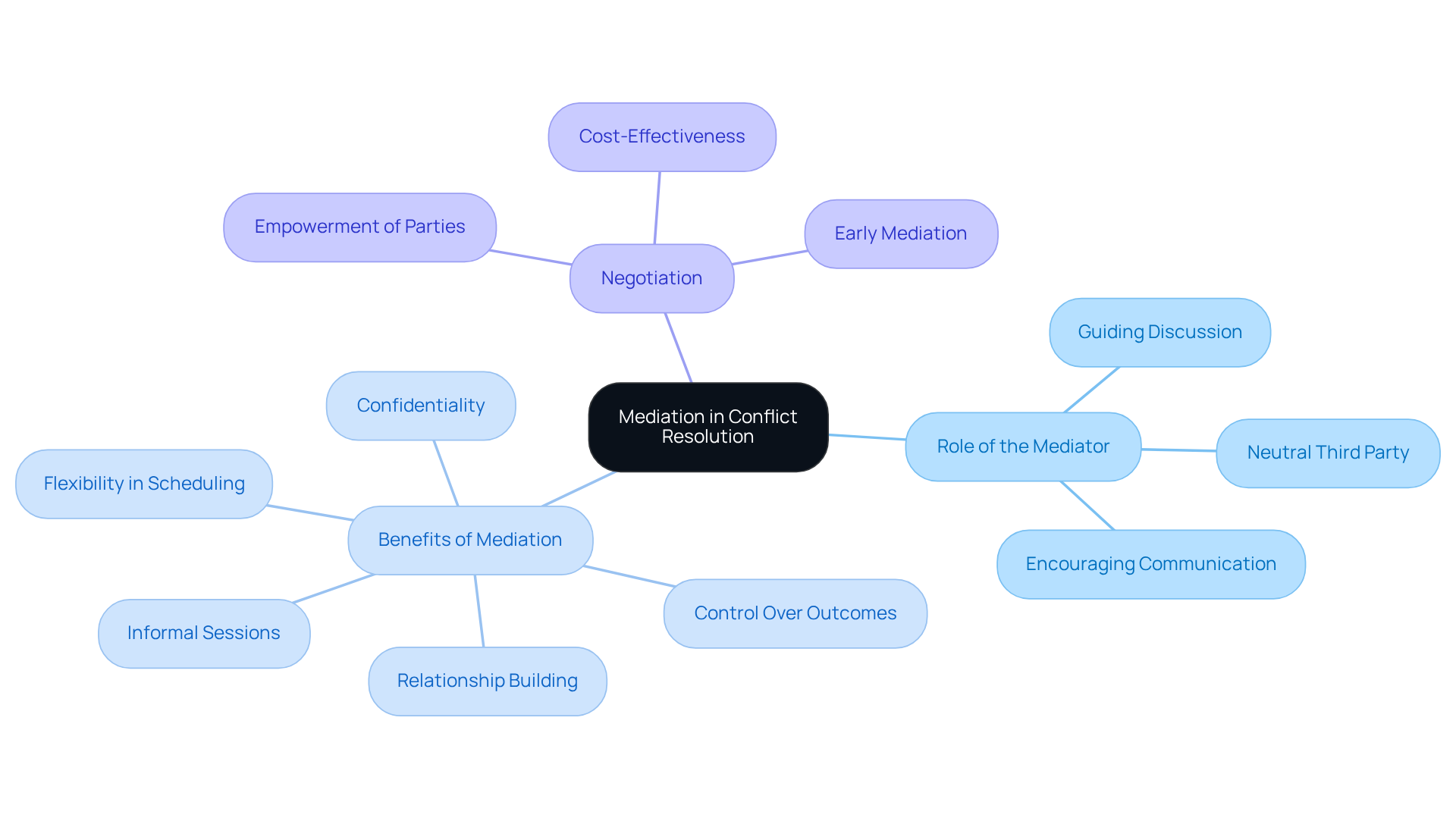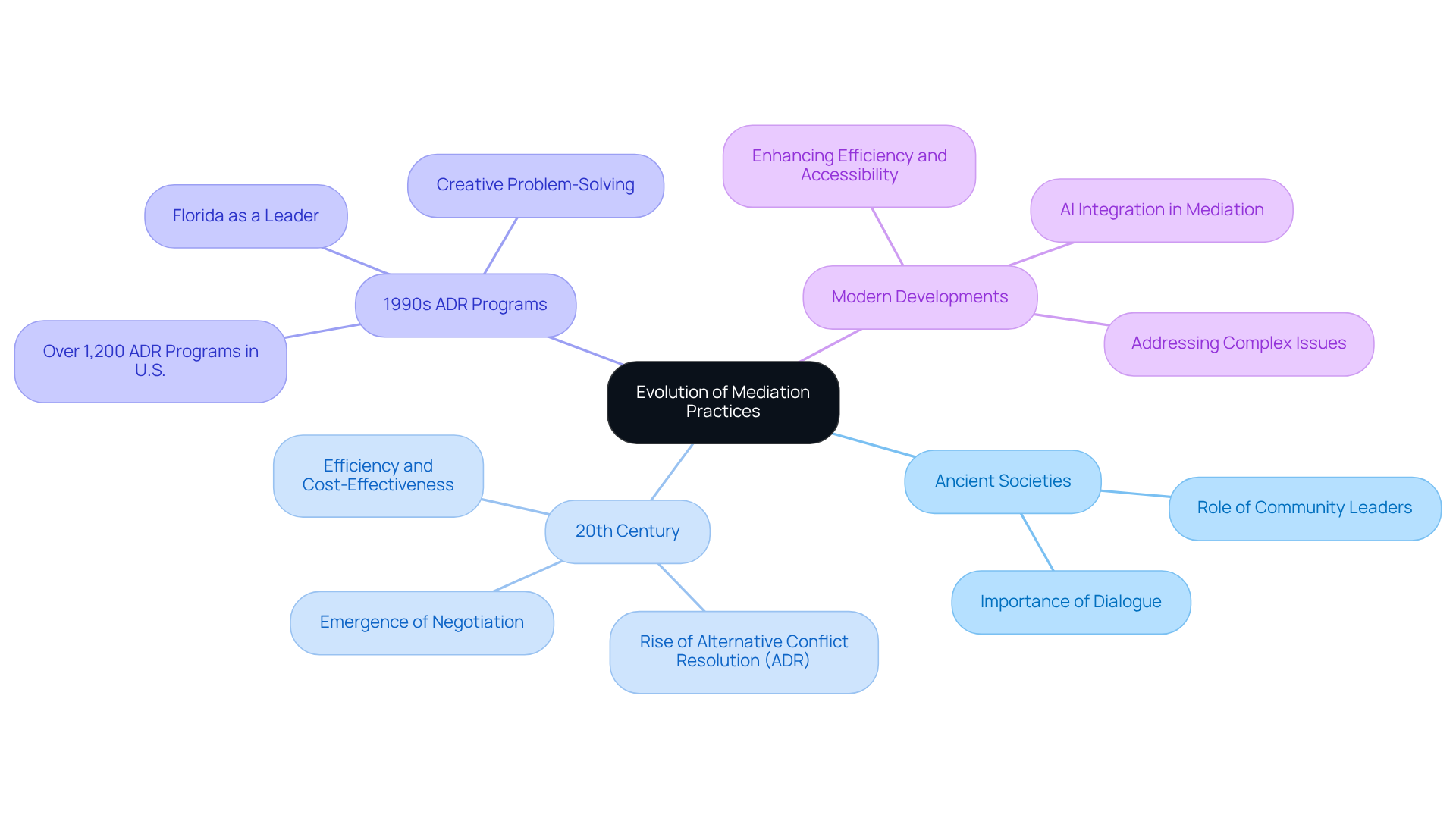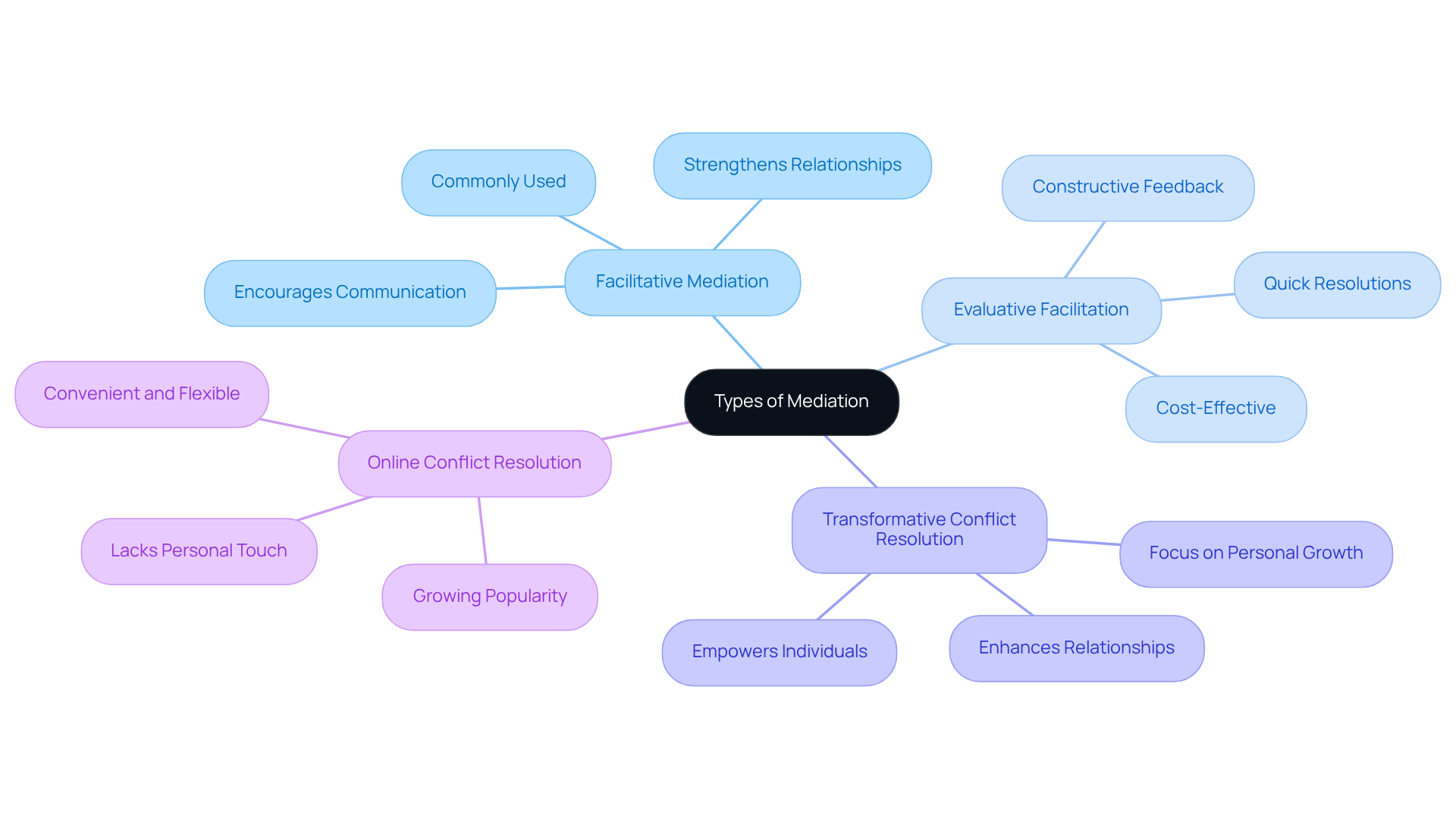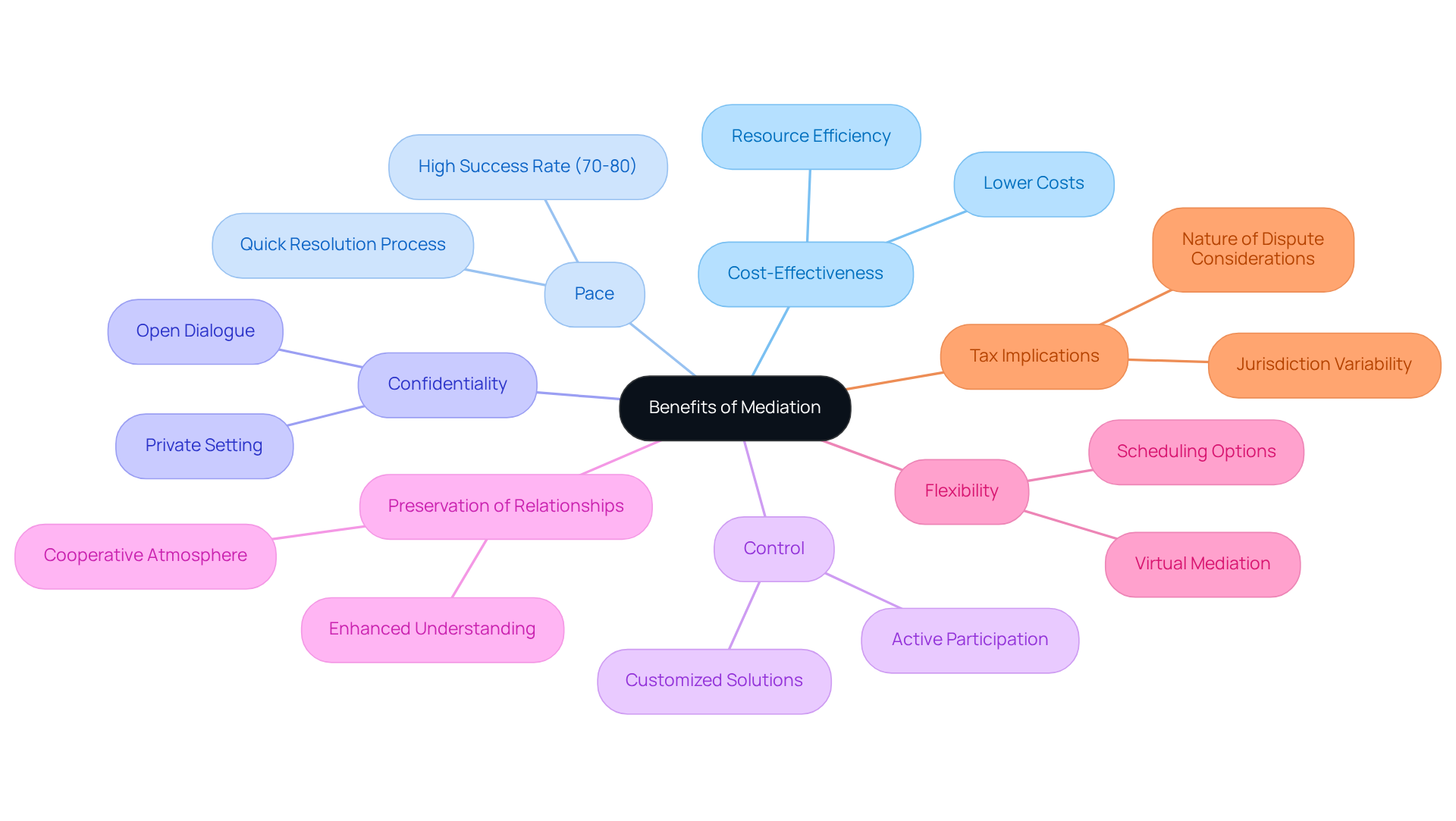
Mediating Definition: Understanding Its Role and Importance
Overview
Mediation is a caring process where a neutral third party helps facilitate communication between those involved in a dispute. This approach aims to guide them toward a resolution that everyone can accept, fostering a sense of cooperation and understanding. Have you ever felt overwhelmed in a conflict? Mediation offers a supportive space to explore solutions together.
The importance of mediation in resolving conflicts cannot be overstated. It is informal and confidential, allowing for open dialogue without fear of repercussions. Through various approaches, mediation nurtures healthier relationships and effective problem-solving. Imagine how much easier it would be to navigate disagreements with this kind of support.
By embracing mediation, we can cultivate an environment where everyone feels heard and valued. It’s not just about resolving issues; it’s about building connections and understanding one another. If you find yourself in a challenging situation, consider reaching out for mediation. Together, we can create a path toward resolution that respects everyone's feelings.
Introduction
Mediation is a vital tool in the realm of conflict resolution, offering a structured yet flexible approach that emphasizes communication and cooperation. As disputes grow increasingly complex, understanding the nuances of mediation can empower us to navigate conflicts more effectively. Have you ever felt overwhelmed when traditional methods fall short? How can mediation transform the way we resolve conflicts?
By exploring the core principles and diverse applications of mediation, we uncover not only its historical significance but also its potential to foster healthier relationships and solutions. Together, we can embrace mediation as a pathway to understanding and resolution, nurturing a more compassionate approach to conflict.
Defining Mediation: Understanding Its Role in Conflict Resolution
Mediation is a structured process where a neutral third party, known as a mediator, helps disputing groups find a mutually acceptable resolution. Unlike traditional litigation, mediation fosters cooperation and emphasizes open communication, allowing individuals to express their needs and interests freely. The mediator does not impose a solution; instead, they guide the discussion, helping participants explore options and discover shared interests. This approach is especially valuable in resolving conflicts where relationships matter, as it nurtures understanding and cooperation among the parties involved.
Mediation sessions are informal, encouraging open dialogue without the rigid protocols of court proceedings. This setting promotes respectful conversations that can ease tensions. Additionally, conflict resolution prioritizes confidentiality, protecting sensitive information and fostering honest communication. The flexibility in organizing sessions further enhances accessibility, accommodating the commitments of all individuals involved.
Importantly, negotiation empowers parties to retain control over the issues and outcomes of their cases, which is a vital aspect of the process. Experts in conflict resolution highlight that negotiation has become an essential tool in settling over 60% of litigated issues in California. This trend is particularly relevant as courts increasingly require negotiation efforts before allowing cases to progress to trial.
Successful negotiation case studies illustrate the effectiveness of this approach. For example, a significant public infrastructure conflict was resolved within a 90-day timeframe through negotiation, demonstrating its adaptability and ability to foster cooperative solutions. Such outcomes underscore the importance of integrating conflict resolution into public policy and legislative frameworks, as advocated by leaders in the field.
In summary, negotiation stands out as a powerful tool for resolving conflicts, particularly in today’s complex environment. By prioritizing communication and cooperation, it not only addresses immediate disputes but also lays the foundation for healthier relationships and more effective problem-solving in the future. How can you embrace negotiation in your own life to foster understanding and resolve conflicts?

Historical Context: The Evolution of Mediation Practices
The roots of mediation can be traced back to ancient societies, where community leaders played a crucial role in facilitating discussions to settle conflicts. Isn't it comforting to know that even in those early days, the importance of dialogue was recognized? Over time, this informal practice evolved into a more structured process, particularly within legal contexts.
The 20th century marked a significant turning point with the rise of alternative conflict resolution (ADR). Negotiation emerged as a favored approach for settling disagreements outside conventional court systems. This shift was largely driven by our growing need for efficient, cost-effective, and friendly resolutions to conflicts. It reflects a wider acknowledgment of the necessity to maintain relationships and encourage collaboration.
By the 1990s, state courts in the U.S. were operating over 1,200 ADR programs, with Florida leading the way. This progress shows how far we've come in seeking understanding and resolution. Expert analysis highlights that conflict resolution not only reduces the time and costs associated with litigation but also encourages creative problem-solving. Have you ever witnessed how such processes can facilitate partial agreements within tight timeframes, even in high-profile cases?
This evolution emphasizes the crucial function of negotiation as a mediating definition in the context of modern conflict resolution. It showcases its effectiveness in addressing intricate issues while preserving the dignity and respect of all parties involved. Additionally, the integration of AI in mediation processes is reshaping the mediating definition of dispute resolution, enhancing efficiency and accessibility. These ongoing advancements reflect our commitment to making conflict resolution more approachable for everyone. Together, we can foster a more harmonious environment where understanding prevails.

Types of Mediation: Exploring Different Approaches and Settings
Facilitation encompasses a variety of unique forms, each designed to address specific situations and needs with care and efficiency. Let’s explore some key approaches together:
-
Facilitative Mediation: In this model, the mediator nurtures communication between parties, encouraging them to explore options and discover their own solutions without imposing suggestions. This method shines in fostering collaboration and strengthening relationships. Many individuals have left successful case studies with a deeper understanding of each other's viewpoints. It’s no wonder that facilitative negotiation is the most common form of conflict resolution, reflecting its widespread acceptance and effectiveness in various scenarios.
-
Evaluative Facilitation: Here, the mediator thoughtfully evaluates the strengths and weaknesses of each side’s stance, offering constructive feedback that guides them toward an agreement. This approach is often favored in situations that require quick resolutions, making it a cost-effective choice for many. Evaluative dispute resolution is particularly beneficial in court-mandated scenarios, where mediators leverage their legal knowledge to promote fair outcomes.
-
Transformative Conflict Resolution: This approach emphasizes personal growth and mutual understanding, aiming to empower individuals and enhance their relationships. By focusing on the relational aspects of conflict, transformative facilitation can lead to positive changes that enable individuals to resolve future disagreements on their own. However, it’s important to note that it may not always address immediate practical concerns, which can be a drawback in certain contexts.
-
Online Conflict Resolution: The rise of technology has significantly increased the popularity of virtual negotiation, allowing individuals to engage in dispute resolution from afar. This trend reflects a broader shift toward more accessible and flexible options, catering to the evolving needs of clients. While online conflict resolution offers convenience, it may lack the personal touch of face-to-face sessions, which could be a disadvantage for some.
Each form of conflict resolution provides unique benefits, making this approach a versatile tool for resolving disputes. However, it’s essential to consider the potential downsides of each method, such as the possibility of longer resolution times or the need for more structured guidance in certain situations. With approximately 70% of individuals in the USA expressing a preference for mediation each year, understanding these approaches is vital for selecting the most suitable method for your specific circumstances. We’re here to support you in navigating these choices.

Benefits of Mediation: Why Choose This Method for Dispute Resolution
Mediation offers a range of compelling advantages that make it a preferred choice for resolving disputes.
-
Cost-Effectiveness: Mediation typically incurs lower costs than litigation, as it demands fewer resources and less time. This efficiency allows you and your group to manage expenses effectively, making it an appealing choice for both individuals and organizations.
-
Pace: The resolution process can often begin quickly, enabling you to tackle disagreements in a timely manner. With a success rate of 70 to 80% in reaching agreements, mediation can lead to resolutions that are not only swift but also satisfactory for everyone involved.
-
Confidentiality: Unlike court proceedings, mediation takes place in a private setting, protecting your interests and sensitive information. This confidentiality fosters a more open dialogue, encouraging honest communication.
-
Control: In mediation, you retain greater control over the outcome, actively participating in the creation of the resolution. This collaborative approach allows you and your group to customize solutions that address your specific needs.
-
Preservation of Relationships: Mediation encourages a cooperative atmosphere, making it particularly suitable for disputes where ongoing relationships are vital. By focusing on understanding and teamwork, mediation helps preserve and even enhance relationships among individuals.
-
Flexibility: Mediation offers flexibility in scheduling and can be conducted virtually, enhancing accessibility and convenience for all parties involved.
-
Tax Implications: It's essential to consider potential tax implications of settlement agreements, as these can vary based on jurisdiction and the nature of the dispute.
These benefits highlight why mediation is increasingly favored by individuals and organizations seeking effective and amicable solutions to their conflicts. By choosing mediation, you are taking a positive step towards resolution that respects everyone’s needs.

Conclusion
Mediation plays a vital role in resolving conflicts, encouraging constructive dialogue and nurturing understanding among those involved. With the help of a neutral mediator, individuals can work through their differences in a supportive environment, leading to outcomes that benefit everyone. This process not only prioritizes open communication but also highlights the importance of maintaining relationships, making it a valuable alternative to traditional litigation.
Throughout this discussion, we have explored various facets of mediation, including its historical development, diverse approaches, and the many advantages it provides. From its ancient origins to contemporary practices, mediation has evolved into a structured yet adaptable process that meets the needs of individuals and organizations alike. It’s important to note that mediation is often more cost-effective, quicker, and better at preserving relationships than conventional court proceedings, which is why it is increasingly preferred by those seeking resolution.
As our society continues to change, we cannot underestimate the importance of mediation in resolving conflicts. Embracing mediation empowers us to take charge of our disputes while fostering a culture of understanding and collaboration. Whether in personal or professional contexts, incorporating mediation into our conflict resolution strategies can lead to more harmonious interactions and effective problem-solving. Let’s recognize the potential of mediation and actively seek its application in our daily lives, creating a more peaceful and cooperative environment for all.
Frequently Asked Questions
What is mediation?
Mediation is a structured process where a neutral third party, known as a mediator, assists disputing groups in finding a mutually acceptable resolution. It emphasizes cooperation and open communication.
How does mediation differ from traditional litigation?
Unlike traditional litigation, mediation fosters cooperation and allows individuals to express their needs and interests freely, rather than imposing a solution. It encourages informal dialogue and respectful conversations.
What is the role of a mediator in the mediation process?
The mediator guides the discussion, helping participants explore options and discover shared interests without imposing a solution.
Why is confidentiality important in mediation?
Confidentiality protects sensitive information and fosters honest communication between the parties involved, encouraging open dialogue.
How flexible is the mediation process?
Mediation sessions are flexible and can be organized to accommodate the commitments of all individuals involved, enhancing accessibility.
What control do parties have in mediation?
Mediation empowers parties to retain control over the issues and outcomes of their cases, allowing them to negotiate their own solutions.
How prevalent is negotiation in conflict resolution?
Experts highlight that negotiation has become essential in settling over 60% of litigated issues in California, with courts increasingly requiring negotiation efforts before cases progress to trial.
Can you provide an example of successful negotiation?
A significant public infrastructure conflict was resolved within a 90-day timeframe through negotiation, showcasing its adaptability and effectiveness in fostering cooperative solutions.
What is the broader significance of integrating conflict resolution into public policy?
Integrating conflict resolution into public policy and legislative frameworks is important for addressing immediate disputes and laying the foundation for healthier relationships and effective problem-solving in the future.


